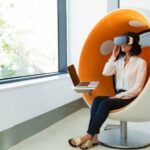The new training tool is designed to promote empathy for colleagues from ethnic minorities
The National Health Service (NHS) is piloting a new virtual reality training tool to offer employees insights into the experiences of colleagues from minority ethnic backgrounds.
The VR technology, called “Walking in the shoes of…”, was setup by the UK’s government funded healthcare system to prevent a black, Asian, and other ethnic minorities from leaving.
Global news provider ‘The Guardian’ shared the news, relaying the reported ‘persistent’ and ‘intolerable’ levels of racism experienced within the workplace, which also applies to career advancements with white nurses being twice as likely to be promoted than black or Asian nurses.
Prof Stephani Hatch, a professor of sociology and epidemiology at the Institute of Psychiatry, Psychology & Neuroscience at King’s College London, described the VR training as an “incredibly creative” means of understanding staff experiences across the NHS: “The VR allows for the user in some cases to experience discrimination, but also to be in a position to witness instances of discrimination too… and VR gave us an opportunity to use creative methodologies”.
“It’s really important for us that this training hits management and leadership. I would love to see a room full of middle-level managers undertaking the training because they can often be the gatekeepers.”
VR vs Racism
The VR training tool is based on 133 interview transcripts with NHS employees who were asked to give details of racist experiences they have had while at work.
The feedback was collected as part of the Tides study, a project setup by researchers at King’s College London to uncover health inequalities resulting from discrimination.
The Guardian detailed two scenes from the tool, including a black nurse called Tunde being told by his manager that personal protective equipment should be locked away to prevent theft at night.
In another scene, an Asian doctor is fired by an HR manager after highlighting a ‘double standard’ related to shift changes during the pandemic, which white colleagues were being granted while ethnic minority workers were not.
So far, the training has been undertaken by 270 staff members at the South London and Maudsley NHS Foundation Trust and the Royal Marsden NHS Foundation Trust.
Dr Rebecca Rhead, a lecturer in society and mental health at Kings, points to the benefit it can bring to the victims of discrimination: “Our research really gave us an insight into the toll their experiences in the workplace had taken on their mental health and the impact it has had on their ability to provide care and continue to work in the NHS.
“This is partly why virtual reality in this form is so powerful because it alleviates the burden of reliving their trauma and spares them the exhausting emotional labour of having to tell people about their sometimes harrowing experiences.”
Last month, the celebrity healthcare professional, Dr Alex George, visited an NHS training space at the University of Hertfordshire, where student doctors and nurses are leveraging Meta Quest 3 hardware for training and upskilling opportunities.
Earlier in the year, Medway Maritime NHS Hospital introduced therapeutic virtual reality (TVR) to reduce feelings of pain and anxiety for patients undergoing Interventional Radiology (IR) procedures under local anaesthetic.
Quelle:


